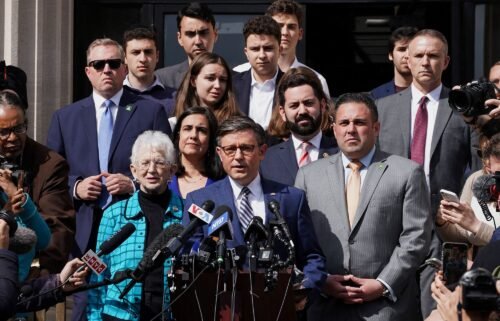Mitch McConnell has to condemn this power grab

The 2019 election in Kentucky may be a preview of what’s to come in 2020 — and so far, it’s not pretty. Republican Gov. Matt Bevin lost reelection by a small margin, but instead of conceding defeat, he is making unfounded claims of voter fraud to question the result. The way we, as a democracy, respond to Bevin’s behavior may tell us a lot about what will happen if President Donald Trump tries the same tactic in 2020.
After the initial count of all of the votes in the Kentucky gubernatorial election, Bevin is down to Democrat Andy Beshear by just more than 5,000 votes. Per his right under Kentucky law, Bevin has requested a “recanvass” of all machines, though a recanvass has never changed the vote totals in Kentucky by more than a handful of votes.
More concerning than the recanvassing request is what Bevin said about the legitimacy of the election: On election night, he made unsubstantiated claims of voting “irregularities,” citing no evidence whatsoever. He doubled down the following day during a news conference, stating, “We know there have been thousands of absentee ballots that have been illegally counted. We know there are reports of people being turned away … things that need to be corroborated and looked into. We know that in Jefferson County, there were a number of machines that did not work properly.”
He also likened the Kentucky election, once again with no evidence, to the absentee balloting fraud in a 2018 North Carolina congressional election, which was uncovered not by a candidate but by election officials before the certification of the results.
Gov. Bevin provided no corroboration for any of these allegations, and no election officials or anyone else have offered any details to suggest that these statements are true. Bevin is raising the specter of massive voter fraud without any evidence, calling into question the legitimacy of the election based on nothing, it seems, beyond his disappointment at the result.
Our political leaders must respond forcefully to Bevin’s tactics. Doing so would provide a blueprint for how to handle the possibility of President Trump losing the 2020 election but refusing to concede. Trump has already falsely claimed, numerous times, that the 2016 election entailed massive voter fraud, and he won that election. He also refused to say that he would accept defeat in 2016. What will happen if Trump loses in 2020?
Our democracy requires that any candidate, regardless of party, graciously concede defeat if they have lost so that there may be a peaceful transfer of power. When Democrat Stacey Abrams lost the election for governor of Georgia in 2018, many Republicans — and some academics — blasted her for refusing to say that Kemp was the “legitimate” governor because of the voter suppression that occurred.
As I wrote, “That hedging is itself harmful to democratic legitimacy.” Though she is correct to use her loss as a mechanism to fight voter suppression in the future, she should have accepted the result under the rules of the election at that time. (And Abrams at least had some evidence that electoral shenanigans — in the form of systemic voter suppression — had taken place. Bevin has none.)
Leaders of both parties must refuse to allow a losing candidate to use rhetoric of stolen elections or voter fraud without evidence, as it undermines the public’s confidence in our electoral system.
Many Republican leaders in Kentucky, however, are either echoing Bevin’s unsubstantiated claims or staying quiet. State Senate President Robert Stivers, for instance, suggested that the legislature might have to decide the election. Although Bevin has the legal right to contest the election in the Republican-controlled legislature, there appears to be no legitimate reason to do so. It would be a pure partisan power grab.
Although it is a state and not a federal race, Republican Sen. Mitch McConnell — as the elder Republican in the state — should call out Bevin for undermining democratic legitimacy in this way. He need not officially declare Beshear the winner — the recanvass will still occur and the State Board of Elections need not certify the results as official until November 25 — but McConnell and others should not allow a sitting governor to peddle myths of voter fraud to question an election.
A statement from McConnell would go a long way toward setting a precedent that it is dangerous for an incumbent to try to hold onto power by fabricating claims of electoral malfeasance. All Republicans — and Democrats — should demand that Bevin provide actual evidence of his allegations or cease making them. Doing so would send a message to Bevin, Trump, and anyone else that they may not undermine the legitimacy of our electoral institutions without substantiation. Thankfully, a few Republican legislators have said they would not welcome an election contest. But they must go further and strongly denounce Bevin’s speculation of electoral “irregularities.”
The way Republican leaders act over the next few days and weeks with respect to Kentucky’s close election may tell us a lot about our democracy’s ability to handle a close presidential election next year. Let’s hope that the good sense of electoral legitimacy can prevail.



